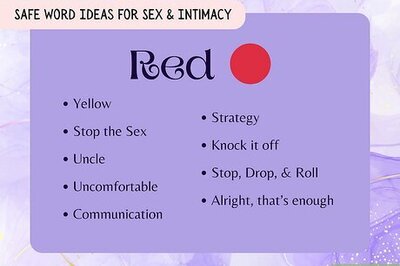
views
New Delhi: Pakistan foreign minister Shah Mahmood Qureshi had last week acknowledged that Jaish-e-Mohammed chief Masood Azhar, the masterminded behind several terror attacks in India, is in Pakistan.
Qureshi further said that Azhar is really unwell and not in a position to even leave his house. In an interview with CNN, Qureshi had said that for Pakistani authorities to arrest Azhar, India would first have to hand over proof that is “acceptable in Pakistani courts”.
As the revelation hit the world hard, including those in his own country, the foreign minister came out with another startling revelation — that Islamabad government has been in touch with the banned terror outfit.
Qureshi divulged this during an interview with the BBC after he was pressed about why Pakistan has failed to take any action against JeM despite it claiming responsibility for the Pulwama terror attack, in which 40 CRPF jawans were killed.
Within 24 hours, Qureshi may have slowly turned into Pakistan’s worst nightmare. But, many believe there is a different side to his statement.
“His statement on Masood Azhar is actually a good thing. How and why should Pakistan deny his presence on its soil. Shah Mahmood Qureshi said exactly what he has been asked to say. I'm sure he's toed the line of the Imran Khan-led government. He won't say it otherwise. Him being candid is appreciable in a way,” said Raza Rumi, a Pakistani political analyst and editor of Daily Times.
The analyst further explained that Pakistan has had a tough time when it comes to terrorism. “Since the war on terror, Pakistan has had to deal with militants, who crossed over, and has also fought against anti-state insurgents. But now, look at FATA (Federally Administered Tribal Areas). It's completely into the mainstream. They have taken out anti-state extremists. Now they are dealing with these big organisations. It's not easy because once you slip, these big outfits will become a huge problem for Pakistan domestically,” he said.
The firebrand leader, considered to be one of the close aides of Prime Minister Imran Khan, had been critical of the Indian government’s alleged politicisation of the whole incident. Earlier, Qureshi had said that he had anticipated PM Narendra Modi to pull something of this sort since elections were round the corner.
In fact, during his recent speech in the Pakistani Assembly, he tore into India’s political leadership citing statements by Shashi Tharoor and BS Yeddyurappa to cement his claim that Modi government was doing this only for votes.
This is not Qureshi’s first stint as Pakistan foreign minister. Qureshi had earlier held the position from 2008 till 2011 during the former Pakistan Peoples’ Party (PPP) government. As far as professional qualifications are concerned, Qureshi holds MA (Law) and MA (History) degrees from Cambridge University. Born in Murree, he belongs to a wealthy Sufi Muslim family who claim to be the descendants of the shrine of Bahauddin Zakariya. It is a claim that Qureshi is known to have used during his political career. His father was a former member of the Senate of Pakistan and also a former governor of Punjab.
Having always dreamt of the Prime Ministerial seat, Qureshi has come close to realising his dream many times. But, as always ended up as the second-in-command. “He's the second most senior party member in the party. Many say he does have PM ambitions. But depends on how far he will go and how much he can achieve,” said Rumi.
He was PPP’s candidate during the 2002 general elections in Pakistan and was pitted against Benazir Bhutto. When Bhutto was killed in an attack six years later, her husband Asif Ali Zardari is said to have considered giving the post to Qureshi. But eventually, it was Yousuf Raza Gilani who took the seat of power.
Around 2011, rumours of Zardari’s alleged proximity to the US authorities, including the CIA, floated stronger than ever. Qureshi was the foreign minister then and his office issued a statement which said that a CIA operative, charged with the murder of two locals, was not a diplomat as per Pakistani records. Zardari is said to have been taken aback and in the following cabinet, he let Qureshi go of his foreign office post, handing him the water and power ministries.
Qureshi denied the post, calling his refusal to get on board Zardari’s new cabinet “an act to protect the nation’s honour”. This did well to catapult him to the domestic spotlight.
Then in November 2011, Qureshi resigned from PPP and decided to join the Pakistan Tehreek-i-Insaf (PTI).
The elections in Pakistan last year, in which PTI clinched a victory, were marred by rumours of severe military involvement. Prime Minister Imran Khan and his party members, however, vehemently denied the accusations, saying they had won through free and fair elections.
“He is known to be extra cautious when it comes to treading the fine balance between the military and the civilian government. But this government is unique as the two are on the same page and there are no signs of disharmony. Qureshi wants to keep all stakeholders engaged and supportive while he undertakes diplomacy business,” Rumi added.
















Comments
0 comment